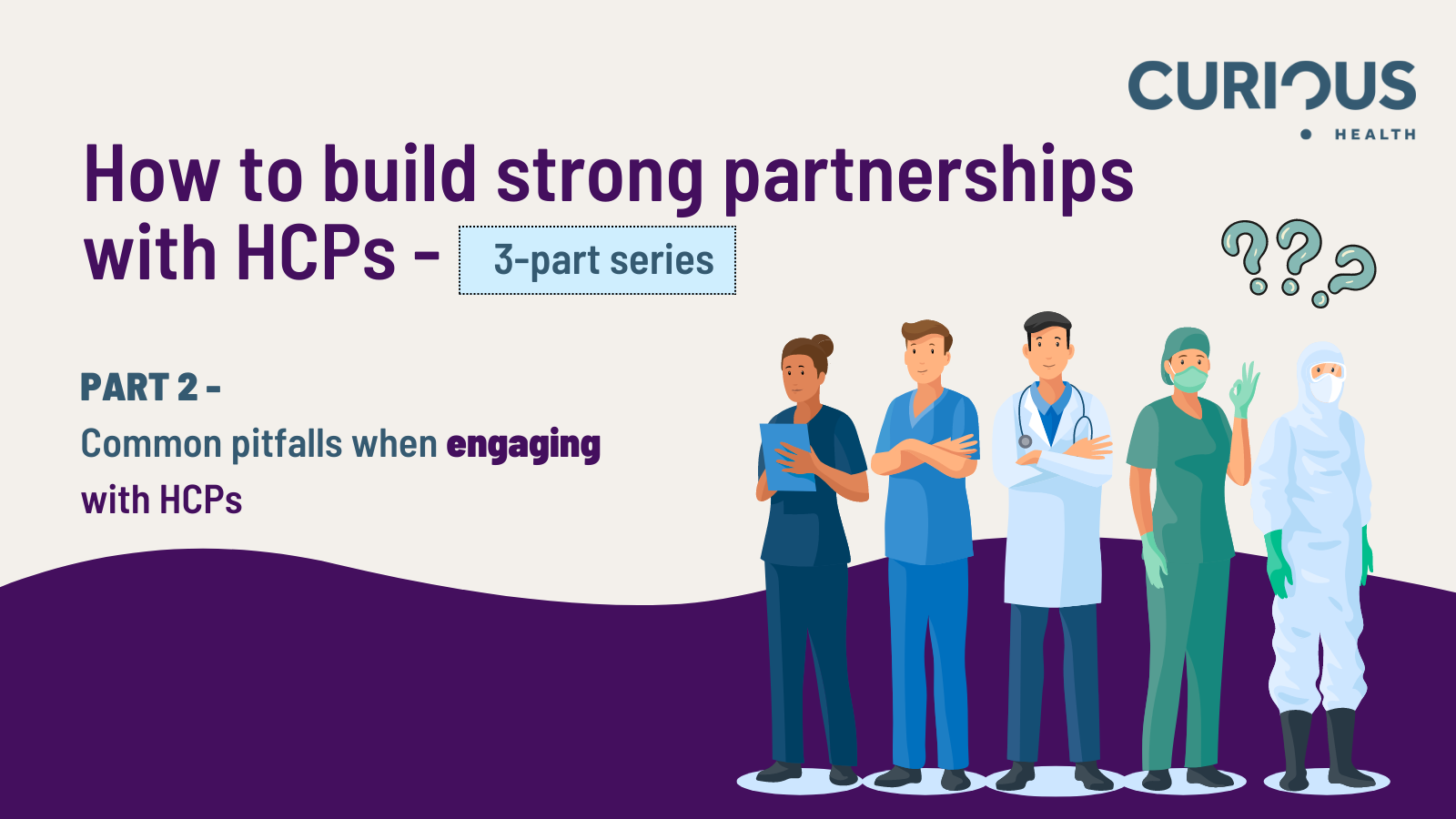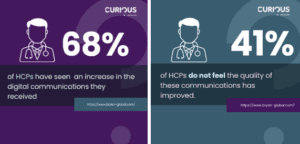Common pitfalls when engaging with HCPs

How to build strong partnerships with HCPs – Three-part series
Part 2: Common pitfalls when engaging with HCPs
In part two of our series ‘ How to build strong relationships with HCPs’, we’re delving into the common pitfalls to steer clear of when engaging with them ensuring that your approach is valuable, respectful and effective. Let’s look at them in turn…
1. Sharing the wrong content:
We know that HCPs are busy people, and it’s only getting worse. A recent YouGov poll reports that 71% of NHS staff say they don’t have enough time to provide the level of patient care they want to.(1) When time is precious, we need to be sure that the content we provide is truly valuable.
Our friends at Bryter, an insights and consultancy agency, surveyed just over 540 HCPs (specifically, oncologists) to understand attitudes towards digital content that they received from pharmaceutical companies. The majority (68%) agreed that they’ve seen an increase in the digital communications they receive from pharma companies. However, 41% do not feel the quality of these communications has improved and a third felt that the content they had received in the last 6 months was rarely useful to them.

Source: Bryter’s report – ‘Physicians want better information and more on-demand content from Pharma’
How do we overcome this?
Making sure your audience insights are top-notch is the first step, both in terms of WHAT your audience wants to know and HOW they want that information delivered.
“With digital now a central part of the channel mix, weak digital content risks undermining strategy by at best failing to engage the intended audience and at worst actively wasting their time. Churning out more and more content without first understanding audience needs simply compounds this. Bryter’s research has shown time-and-again how missing the mark on content leaves HCP needs unfulfilled and enthusiasm for brand engagement diminished. Using effective primary research to understand needs and wants from before campaigns are developed means pharma can build campaigns that stand out, providing content HCPs need at the right time, via the right medium – and ultimately ensuring their products stay top of mind when decisions are made.”
Laurence Olding, Director – Bryter
2. Forgetting about search
Yes, online medical journals continue to be the information sources with the highest reach and impact score (2), but following a very close second is search. HCPs, just like everyone else, rely heavily on search to stay abreast of therapy area and drug news.
At Curious Health, we believe that having a strategy that harnesses SEO is an important way to make sure you’re reaching healthcare professionals where they are already going for information. That’s why we partner with Performance.IO to deliver integrated SEO programs that will maximise your exposure among target HCP audiences.
But we also know that SEO is just one part of the marketing mix. Digital PR is another important piece of the puzzle that you can’t afford to ignore.
Why? Because just because content exists online doesn’t mean it’s doing its job. Good digital PR can help you build online authority for your company or brand, while also delivering on the classic communications discipline of growing reputation. In fact, many communications programmes in health rarely have a strategy for what we call off-site SEO. That’s a big mistake!
If you’re serious about reaching your target audience and building your brand, you need to have a comprehensive SEO strategy, supported by digital PR and offsite SEO.
You can find more about this topic in our blog ‘Digital PR is not just doing PR online’
3. Thinking it’s digital-only now
We talk a lot about using digital channels to reach HCPs (and consumers), and it’s true that the Covid-19 pandemic acted as a “digital accelerant” (3). However, in the rush to adopt digital solutions, we can’t forget that (like many of us) HCPs are rapidly embracing the chance to collaborate with peers and industry face-to-face again.
60% of UK specialists surveyed preferred a mix of digital and face-to-face engagement (vs 20% preferring digital only and 16% preferring face-to-face only).(4) It’s about giving HCPs a choice in how and where they engage with your content – this is the truly omnichannel approach. While webinars and HCP-targeted social media is going to continue to be important, getting back to the conference centre and creating in-person relationships is essential.
4. Not being responsive
We get it, approvals processes make it hard to be agile and get responses out to HCPs quickly. The trouble is that more than ever we expect near-instantaneous responses to questions we ask of companies. According to a survey conducted by HubSpot, nearly half of all customers (46%) expect companies to respond faster than 4 hours, while 12% expect a response within 15 minutes or less. While we’ve not seen any HCP-specific research on this, it’s a safe bet to assume that consumer trends are reflected amongst doctors, nurses and pharmacists as well.
It’s crucial for HCPs to be able to get in touch with pharmaceutical companies quickly and easily when they have questions or concerns. What can you do to speed things up and ensure HCPs feel they are being responded to in a timely manner? Here are a few ideas:
- First and foremost, make it easy for HCPs to contact you. Provide multiple ways for HCPs to reach you, such as phone, email, and live chat
- Set clear expectations. Let HCPs know how quickly they can expect a response. This will help them to manage their expectations and avoid frustration.
- Explore automation: can you work with your approvals team to gauge their level of comfort with using AI-based chat models with pre-programmed (and approved) responses to common questions? AI chatbots can help signpost HCPs to where to get more information – for example booking a call with an MSL or Med Info
- Provide self-service resources. HCPs should be able to find answers to their questions on their own in the moment, without having to contact you. This can be done by providing a knowledge base or FAQ section on your website.
What does this mean? Where do we go from here?
We come back to the conclusions of the first part of this blog series: the importance of getting to know your HCP audience and how they want to consume content so you can develop strategies that meet those needs. We like to start with questions, why not ask yourself and your team…
- What does the engagement look like on the content we’re sharing with HCPs at the moment? Not just views, how are they sharing your content and acting on it?
- Have you asked your HCP audience what they want from you?
- What search strategy do you have in place to make sure that HCPs are finding your content? Is that strategy reviewed regularly?
- Are you offering HCPs multiple touchpoints? What channels do you offer? Have you dialled-up face-to-face interactions?
- Have you explored ways of speeding up your response time to HCPs?
Get the answer to these questions and you’ll be well on your way to shaping an HCP communications strategy that avoids the mistakes we’ve covered here.
If you are interested in chatting about your challenges and how we can help you, drop us a line at [email protected].
We love getting to the heart of a comms challenging and coming up with ideas that create impact.
If you missed part 1 of our blog series “How to build strong partnerships with HCPs – ‘Understanding HCP behaviours, challenges, and motivations” click here and don’t forget to follow us to be notified of our next blog.
